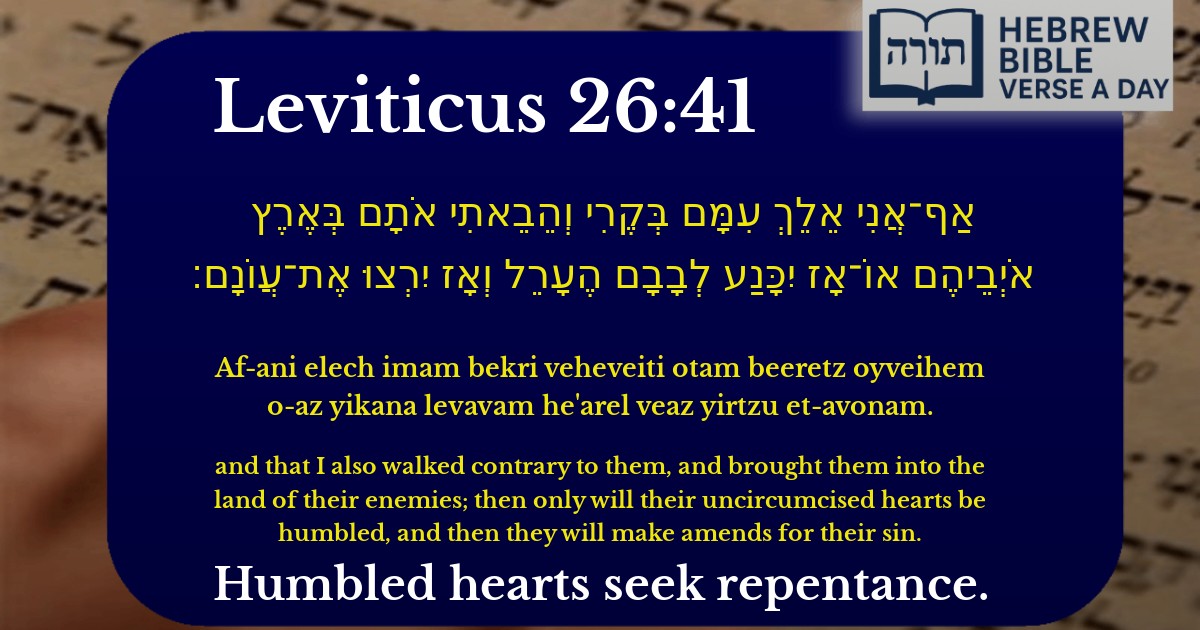Join Our Newsletter To Be Informed When New Videos Are Posted
Join the thousands of fellow Studends who rely on our videos to learn how to read the bible in Hebrew for free!
Hebrew Text
אַף־אֲנִי אֵלֵךְ עִמָּם בְּקֶרִי וְהֵבֵאתִי אֹתָם בְּאֶרֶץ אֹיְבֵיהֶם אוֹ־אָז יִכָּנַע לְבָבָם הֶעָרֵל וְאָז יִרְצוּ אֶת־עֲוֺנָם׃
English Translation
and that I also walked contrary to them, and brought them into the land of their enemies; then only will their uncircumcised hearts be humbled, and then they will make amends for their sin.
Transliteration
Af-ani elech imam bekri veheveiti otam beeretz oyveihem o-az yikana levavam he'arel veaz yirtzu et-avonam.
Hebrew Leining Text
אַף־אֲנִ֗י אֵלֵ֤ךְ עִמָּם֙ בְּקֶ֔רִי וְהֵבֵאתִ֣י אֹתָ֔ם בְּאֶ֖רֶץ אֹיְבֵיהֶ֑ם אוֹ־אָ֣ז יִכָּנַ֗ע לְבָבָם֙ הֶֽעָרֵ֔ל וְאָ֖ז יִרְצ֥וּ אֶת־עֲוֺנָֽם׃
אַף־אֲנִ֗י אֵלֵ֤ךְ עִמָּם֙ בְּקֶ֔רִי וְהֵבֵאתִ֣י אֹתָ֔ם בְּאֶ֖רֶץ אֹיְבֵיהֶ֑ם אוֹ־אָ֣ז יִכָּנַ֗ע לְבָבָם֙ הֶֽעָרֵ֔ל וְאָ֖ז יִרְצ֥וּ אֶת־עֲוֺנָֽם׃
🎵 Listen to leining
Parasha Commentary
📚 Talmud Citations
This verse is not quoted in the Talmud.


Context in the Torah
This verse appears in Vayikra (Leviticus) 26:41, within the Tochacha (Rebuke), where Hashem warns of the consequences if Bnei Yisrael stray from the mitzvos. The verse describes a process of teshuvah (repentance) that may occur after exile and suffering.
Meaning of "Walked Contrary to Them"
Rashi explains that "אֵלֵךְ עִמָּם בְּקֶרִי" ("walked contrary to them") means Hashem will treat them with keri—harshness and indifference—mirroring their own casual attitude toward mitzvos. The Midrash (Toras Kohanim) emphasizes that this is a measure-for-measure response to their neglect of Torah.
The Purpose of Exile
The Ramban (Nachmanides) teaches that exile to "the land of their enemies" serves as a refining process. When removed from Eretz Yisrael, the Jewish people confront their spiritual state, leading to yissurim shel ahavah (chastisements of love) that awaken teshuvah.
"Uncircumcised Hearts" and Humility
The term "לְבָבָם הֶעָרֵל" ("uncircumcised hearts") refers to stubbornness and spiritual insensitivity (Rashi). The Sforno adds that only through suffering will their hearts soften, allowing humility (כָּנַע)—a prerequisite for genuine repentance.
Teshuvah and Atonement
The phrase "יִרְצוּ אֶת־עֲוֺנָם" ("make amends for their sin") indicates full repentance. The Talmud (Yoma 86a) distinguishes between teshuvah mi'yirah (repentance from fear) and teshuvah mei'ahavah (repentance from love). Here, the suffering leads to the higher form—accepting guilt and rectifying wrongdoing (Rambam, Hilchos Teshuvah 2:2).
Key Lessons